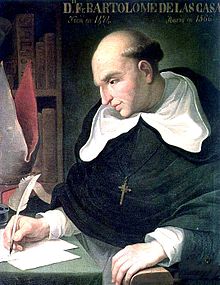Bartolome de las Casas was one of the first Europeans arriving in the Americas to exploit the new world at the beginning of the sixteenth century.
Gradually he came to see deep problems in the colonial effort. He began to oppose the harsh treatment of the native Americans, bringing his case before the Holy Roman emperor. Ironically, at first he called for substituting African slaves for the native slaves. Some suggest he therefore inadvertently played a part in the beginnings of the Transatlantic slave trade. He would in time realize this was a devil’s bargain, and come to call for the end of all forms of slavery.
de las Casas then attempted to launch a new colonial enterprise in Venezuela based on recognition of the rights of the native peoples. When this venture failed, he entered the religious life, becoming a Dominican friar. Sent back to the new world as a missionary he once again took up the cause of the native peoples. He was appointed bishop, but served only briefly due to the opposition of the European colonialists.
Returning to Europe and living mostly within the court of the Spanish king, he achieved renown as a historian, but even more important he spent the rest of his life, some fifty years, as a tireless and fierce opponent of all forms of slavery and as an advocate for the native American peoples.
Bartolome de las Casas died on the 18th of July, 1566.
He is considered by some to be an early advocate of universal human rights. And for this the Episcopal church in the United States honors him with a feast day on July 18th…













